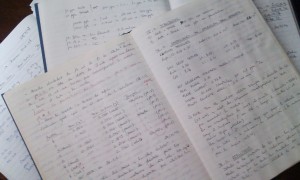Some months ago I blogged about my take on reflective practice. Since then I have been doing a lot of thinking around the topic, mostly because I have started to put together my CILIP Chartership portfolio and demonstrating that I am a reflective practitioner is a key part of the process. After staring at several blank pages, wondering how to start writing reflectively I realised that, before I could go any further, I needed to get a better sense of what my reflective style is.
I reflect, therefore I am
I say this because ‘I know’ I have a reflective style. As explained in my previous post, reflecting comes naturally to me, and this has been confirmed by feedback from others, in various situations, both at work and in education. Whenever I take a learning styles questionnaire, invariably I come up as reflector-theorist-pragmatist in fairly equal parts – my activist is lagging well behind. Why then, am I finding it difficult to write a reflective blog? In part, I guess, it’s lack of practice but there is more to it than that. I started blaming it on the way my mind works and the way I have been trained to think like a scientist.
And then it just dawned on me that having an analytical mind doesn’t stop me from engaging in reflective practice, in fact, it should be quite the opposite.
Doing it like a boffin

It seems to me that the social disciplines have claimed ownership of reflective practice, when in fact scientists do this all of the time. As a scientist, reflecting is a quick cyclical operation. Look back to those days in the chemistry lab. Following a procedure for an experiment, you were told to observe and write copious notes. What happens, can you explain the reaction? What would happen if you repeated it in different conditions? Can you improve the yield? This experiential learning – which also forms the basis of scientific research – relies heavily on reflective practice.
In my previous life as a research chemist I had to do this all the time and I learnt most of the key skills that still serve me well today: attention to detail, analytical and organisational skills, problem solving, and creative thinking amongst others.
The big difference between the pure science and social science approach to reflection is that the former works only with hard facts, whereas the latter is happy to bring in a subjective perspective. I think it could also be said that the reflective practice cycle in hard science happens faster and in smaller increments. That’s how I learnt to apply my analytical mind in the lab: observe problem, hypothesise solution, apply solution, observe reaction, prove or disprove hypothesis and continue this cycle until a theory could be established. By repeating this process it became, not just a way of conducting lab experiments, but also the way in which I operate and approach every learning experience.
Way forward…
There are good and bad news here. On the positive side, I think this reinforces even more the extent of my reflective nature. On the down side, it tells me that I have become so used to my own version of the reflective cycle, that it is difficult for me to externalise it.
What I think I need to do is follow this same process but slow it down so there is more room for the subjective observations to emerge. I also feel that I should not be afraid to use description mixed with my reflection. Much of the advice you get about writing reflectively says to avoid description and that has been worrying me, because I realise I do have a tendency to describe facts (that analytical mind again). However, taking a look at my old lab books, which are in a way the ultimate log, I realised that writing down the facts allows me to review them, draw conclusions and build solutions. Deep down, I’m always going to want something ‘solid’ behind what I say. It’s what makes me who I am, and if accepting that helps me to move forward and find my reflective writing voice, I think I may be onto something.
Leave a Reply